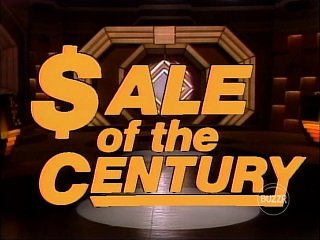
Sale of the Century is an American television game show that debuted in the United States on September 29, 1969, on NBC daytime. It was one of three NBC game shows to premiere on that date, the other two being the short-lived Letters to Laugh-In and Name Droppers. The series aired until July 13, 1973, and a weekly syndicated series began that fall and ran for one season. Actor Jack Kelly hosted the series from 1969 to 1971, then decided to return to acting full-time. He was replaced by Joe Garagiola, who hosted the remainder of the daytime series plus the one season in syndication.
The Joker's Wild is an American television game show that has aired at different times since the 1970s. Contestants answer questions based on categories determined randomly by a mechanism resembling a slot machine. The show's title refers to the game's slot-machine mechanism also having jokers.

The Georgia Lottery Corporation, known as the Georgia Lottery, is overseen by the government of Georgia, United States. Headquartered in Atlanta, the lottery takes in over US$1 billion yearly. By law, half of the money goes to prizes, one-third to education, and the remainder to operating and marketing the lottery. The education money funds the HOPE Scholarship, and has become a successful model for other lotteries, including the South Carolina Education Lottery.

Winning Streak is an Irish television game show, Europe's second longest-running after the UK's Countdown. Aired weekly in Ireland, five contestants play a number of games to win cars, holidays, and cash prizes up to €1,000,000. Broadcast on Saturday nights between September and June on RTÉ One, the game show is among the channel's most popular programmes, often ranking among the top five in the ratings. However, there was a significant drop in viewership in the 2008/2009 series. The show began on 21 September 1990, and has been hosted by popular television personalities Mike Murphy (1990–2001) and Derek Mooney (2001–2008). Prize money for the show is funded by the National Lottery, with entry to the game based on National Lottery scratchcards.
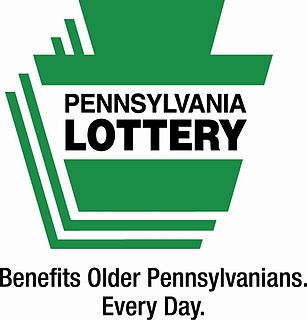
The Pennsylvania Lottery is operated by the Commonwealth of Pennsylvania. The Lottery was created by the Pennsylvania General Assembly on August 26, 1971; two months later, Henry Kaplan was appointed as its first executive director. The Pennsylvania Lottery sold its first tickets on March 7, 1972 and drew its first numbers on March 15, 1972.

Flamingo Fortune is an American game show for the Florida Lottery that aired from 1995–1999. It was originally produced by Mark Goodson Productions, at the time also producing game shows for state lotteries alongside his regular game shows. After the first five shows, production was transferred to Jonathan Goodson Productions, after All American Television spun out their lottery game shows to Mark Goodson's son, Jonathan Goodson. Production would later transfer to Columbia TriStar Television and Game Show Network from 1997 to 1999. The program was taped at Universal Studios Florida near Orlando, Florida.
Illinois Instant Riches is a lottery game show airing in the state of Illinois, as well as nationally on Chicago-based Superstation WGN-TV. The show was hosted by Mark Goodman, with Linda Kollmeyer as his co-host and Bill Barber as announcer.

Wheel of Fortune is an Australian television game show produced by Grundy Television. The program aired on the Seven Network from 1981 to 2004 and January to July 2006 and is mostly based on the same general format as the original American version of the program. After Wheel of Fortune ended, the format was revived by the Nine Network in 2008 as Million Dollar Wheel of Fortune, until it was cancelled in June 2008 due to low ratings and following arguments from long-time host John Burgess concerning why he did not like the revamped format. The rights to the show are currently owned by Network Ten, which now owns the video and format rights through its parent company, CBS Studios International, which holds international rights as the American version is distributed by the company's broadcast syndication arm.
$ale of the Century is an Australian game show that aired on the Nine Network from 14 July 1980 to 29 November 2001. Tony Barber hosted a game show with essentially the same format under the title The $25,000 Great Temptation from 1970-76, and was also the initial host of Sale for over a decade before being replaced by Glenn Ridge in 1991.

Wheel of Fortune was a British television game show based on the American show of the same name created by Merv Griffin. Contestants compete to solve word puzzles, similar to those used in Hangman, to win cash and prizes. The title refers to the show's giant carnival wheel that contestants spin throughout the course of the game to determine their cash and/or prizes. The programme aired between 19 July 1988 and 21 December 2001 and was produced by Scottish Television (STV) for the ITV network - having effectively replaced Now You See It as STV's prime time game show offering for the ITV network. It mostly follows the same general format from the original version of the programme from the United States, with a few minor differences.
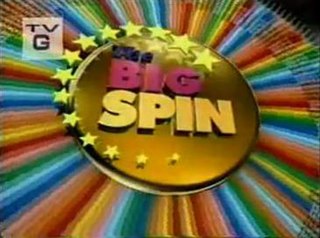
The Big Spin is the California Lottery's first television game show. Originally a Fred Tatashore production, it was later an Alexander Media Services production, followed by a production of Cal Image, and then finally a Jonathan Goodson Production.
The Wisconsin Lottery is run by the Wisconsin Department of Revenue and was authorized in 1988 by the state legislature. It is a member of the Multi-State Lottery Association (MUSL). Its games consist of Mega Millions, Powerball, Megabucks, Supercash!, Badger 5, Pick 3, Pick 4, and scratch games. Since its founding, it has generated $3 billion for property tax relief for state residents.
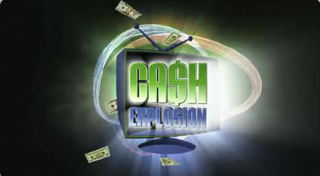
Cash Explosion, known as Cash Explosion Double Play from 1989 until 2012, is an official Ohio Lottery TV game show, which is broadcast on television stations throughout Ohio. The show originated in Cleveland and is now taped by Mills James Productions in Columbus, Ohio. Cash Explosion originally aired from February 7, 1987 to September 30, 2006, at which point the Ohio Lottery replaced it with Make Me Famous, Make Me Rich. However, slumping ticket sales and poor ratings prompted the return of the Cash Explosion format a year later, on October 6, 2007, and it has remained on the air since.

Hoosier Millionaire was an American television lottery game show which aired on television stations in Indiana, Illinois and Kentucky from October 28, 1989 to November 19, 2005.
La ruleta de la fortuna or La ruleta de la suerte is the Spanish version of Wheel of Fortune. The first incarnation ran from 1990 to 1992 in Antena 3, the second one from 1993 to 1997 in Telecinco, and then, after a 9 year hiatus, a revival has been made on Antena 3 beginning in 2006.

Bingo America is an American game show broadcast by Game Show Network. The series follows two contestants as they try to compete to win up to $100,000. Additionally, the series lets at-home viewers print bingo cards online that allow them to play along with the show to win small amounts of money for themselves.

Make Me a Millionaire is the second television game show of the California Lottery, having replaced The Big Spin on January 17, 2009. Originally contracted for a four-year run, the Lottery cancelled the show after eighteen months, with its last episode telecast on July 3, 2010. On July 9, five unaired episodes were uploaded to the California Lottery's official YouTube page.
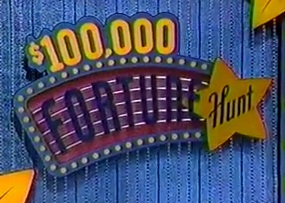
The $100,000 Fortune Hunt is an Illinois Lottery game show which debuted on September 16, 1989, and aired on Saturday evenings from 1989-1994 on WGN-TV in Chicago ; it was also broadcast on WGN's national satellite feed. Jeff Coopwood hosted the first season, with the rest of the run being hosted by Mike Jackson. Linda Kollmeyer served as the hostess during the entire run with Bill Barber as the announcer.















